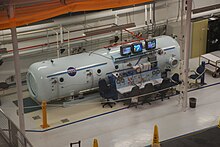Hyperbaric oxygen chamber

The decompression chamber at the Neutral Buoyancy Lab
|
|
| Acronym | DDC |
|---|---|
| Other names |
|
| Uses |
|
A diving chamber is a vessel for human occupation, which may have an entrance which can be sealed to hold an internal pressure significantly higher than ambient pressure, a pressurised gas system to control the internal pressure, and a supply of breathing gas for the occupants.
There are two main functions for diving chambers:
There are two basic types of submersible diving chambers, differentiated by the way in which the pressure in the diving chamber is produced and controlled.
The historically older open diving chamber, known as an open diving bell or wet bell, is in effect a compartment with an open bottom which contains a gas space above a free water surface, which allows divers to breathe underwater. The compartment may be large enough to fully accommodate the divers above the water, or may be smaller, and just accommodate head and shoulders. Internal air pressure is at the pressure of the free water surface, and varies accordingly with depth. The breathing gas supply for the open bell may be self-contained, or more usually, supplied from the surface via flexible hose, which may be combined with other hoses and cables as a bell umbilical. An open bell may also contain a breathing gas distribution panel with divers' umbilicals to supply divers with breathing gas during excursions from the bell, and an on-board emergency gas supply in high-pressure storage cylinders. This type of diving chamber can only be used underwater, as the internal gas pressure is directly proportional to the depth underwater, and raising or lowering the chamber is the only way to adjust the pressure.
A sealable diving chamber, closed bell or dry bell is a pressure vessel with hatches large enough for people to enter and exit, and a compressed breathing gas supply to raise the internal air pressure. Such chambers provide a supply of oxygen for the user, and are usually called hyperbaric chambers whether used underwater or at the water surface or on land to produce underwater pressures. However, some use submersible chamber to refer to those used underwater and hyperbaric chamber for those used out of water. There are two related terms which reflect particular usages rather than technically different types:
...
Wikipedia
